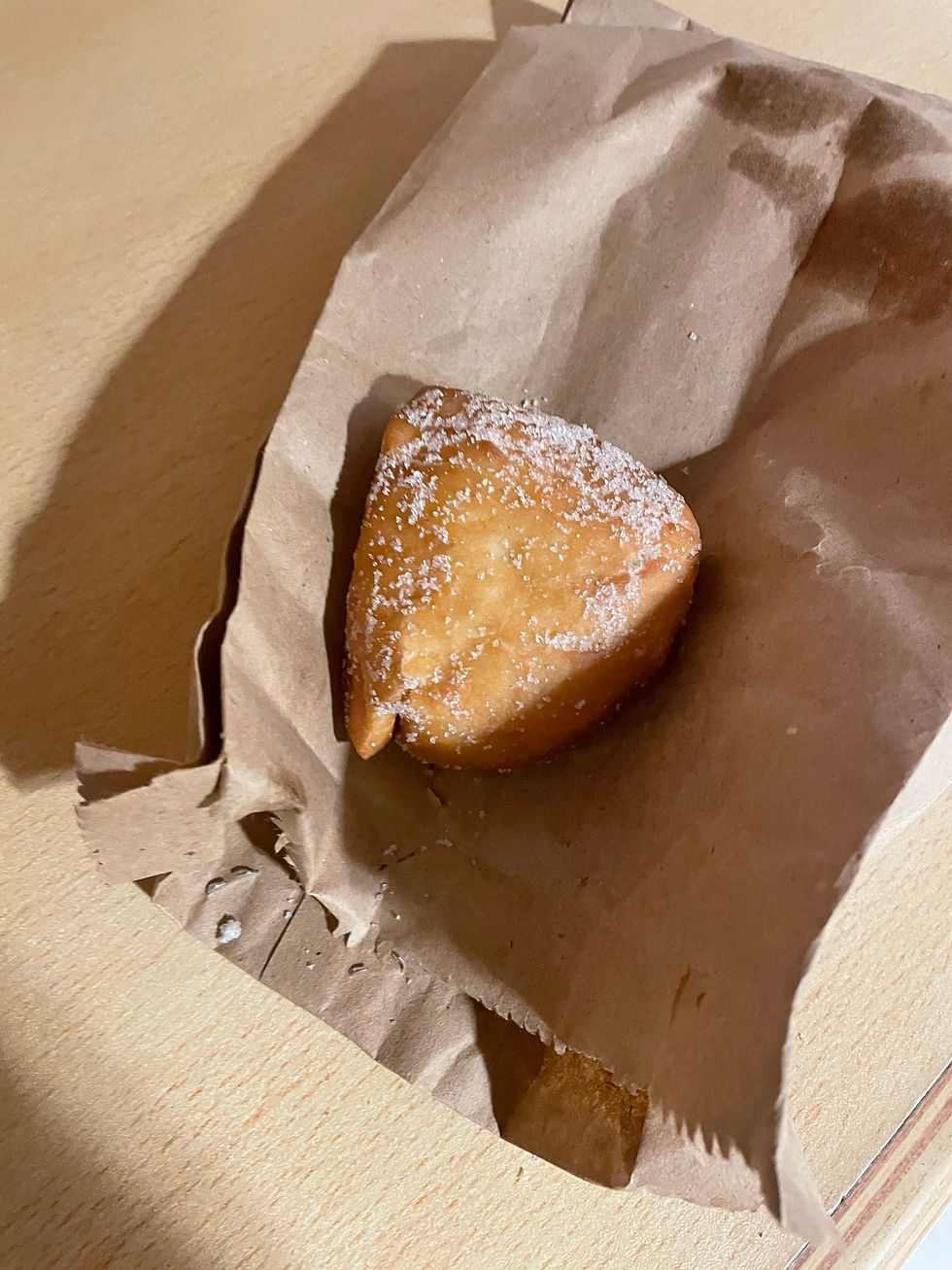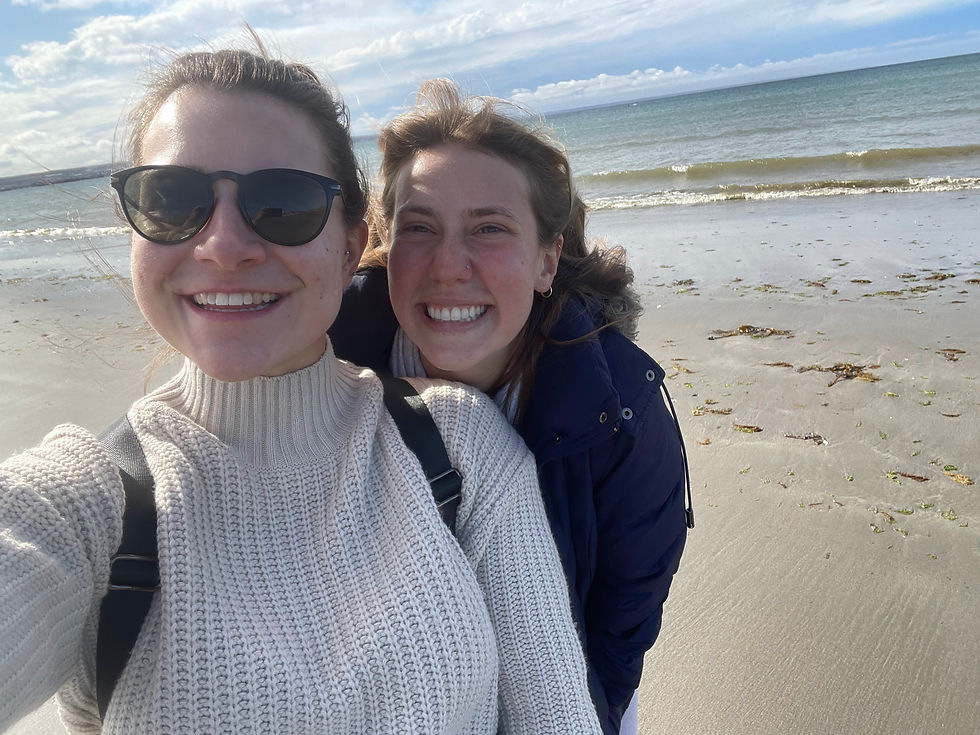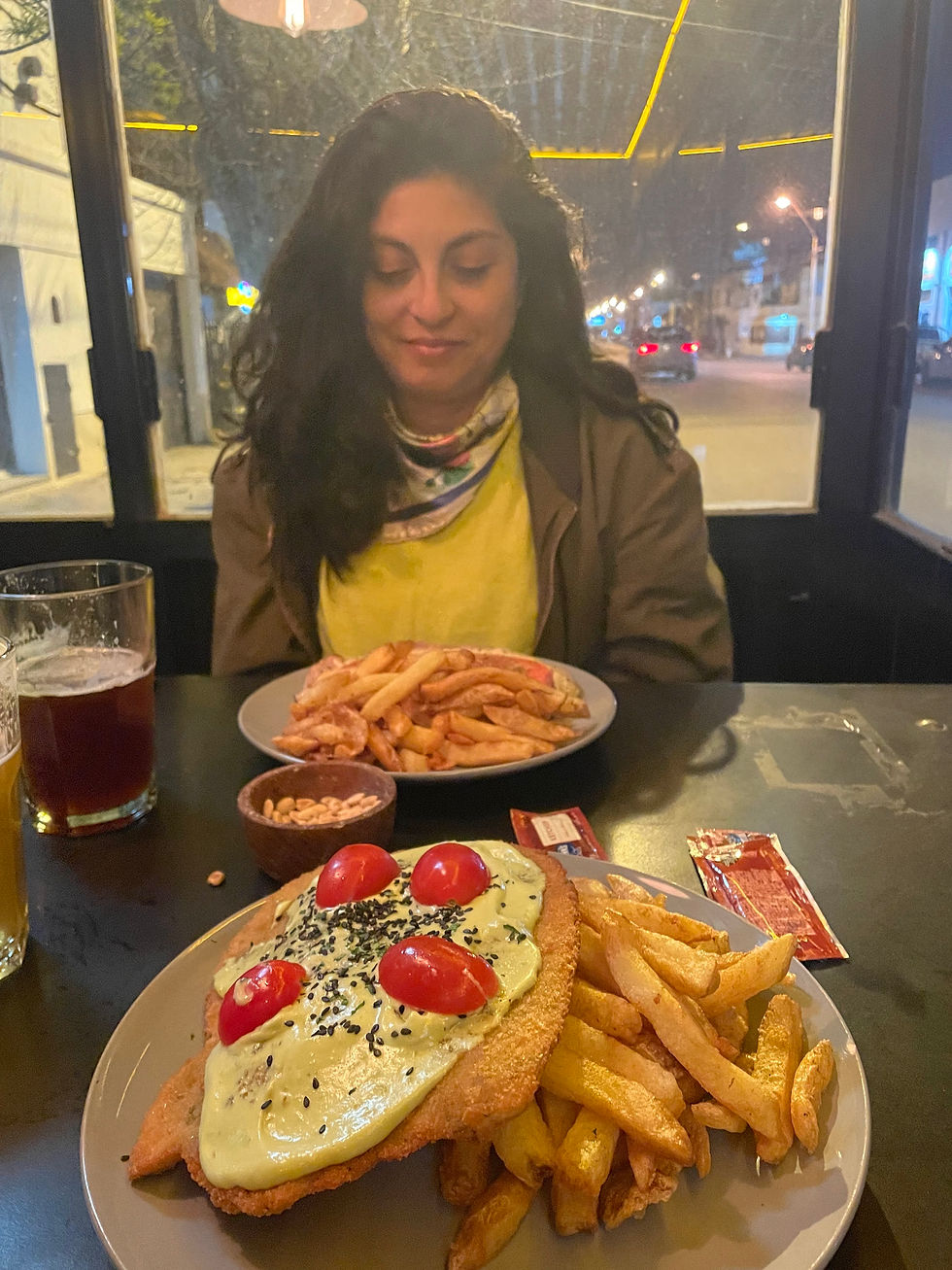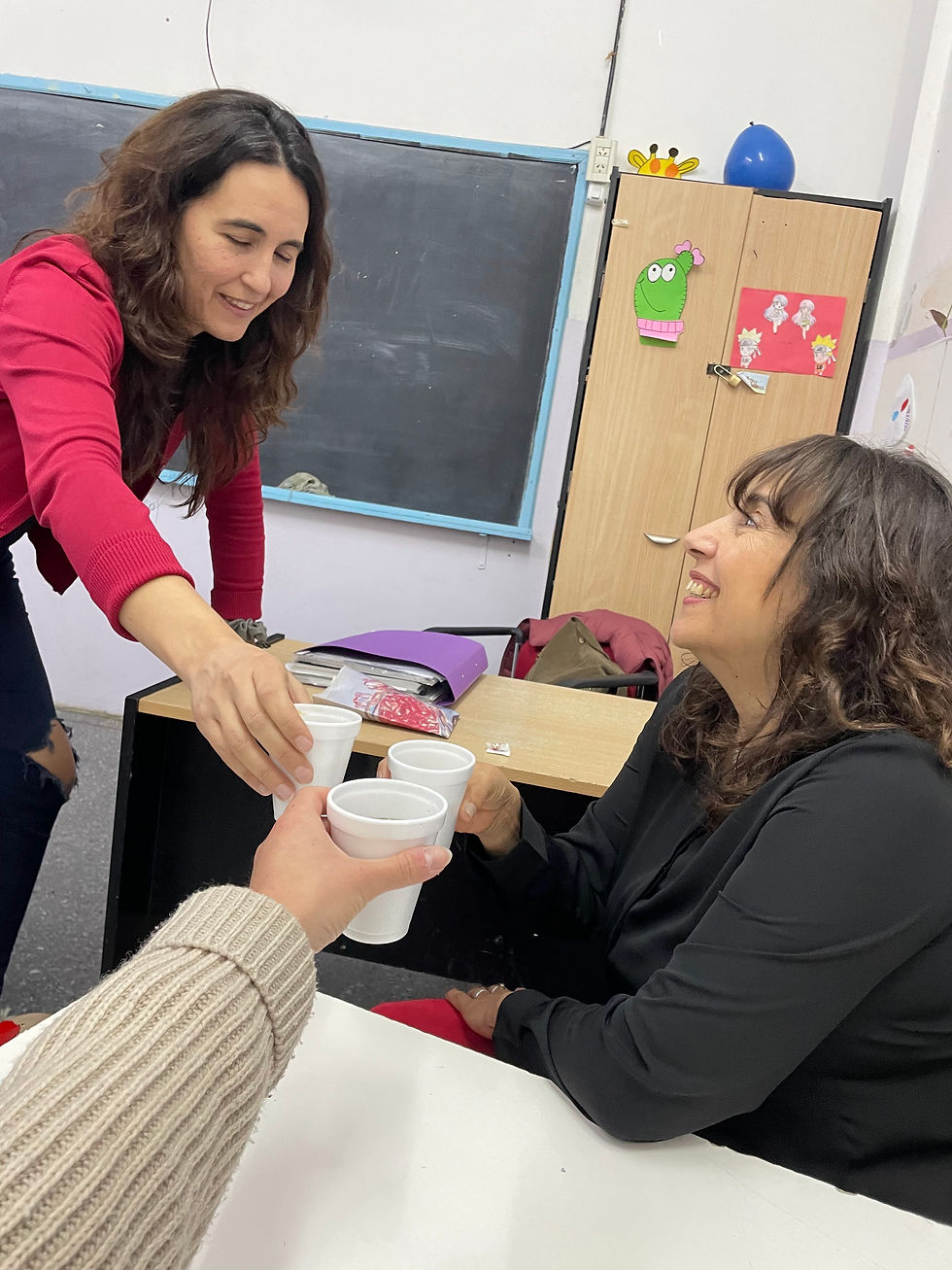And your Spanish? How is that going?
- holalolaz42
- Sep 26, 2022
- 13 min read
Writing this blog post for some reason has been really difficult. I keep having moments of inspiration before getting stuck with absolutely no words to say. I wonder if it is because I have so much to say about this topic? I could talk about how I've started to incorporate Argentine words and the porteño accent into my own Spanish. If I were to do that, I would talk about how it is now so much more natural for me to use vos instead of tú and its respective verb conjugations. I would also mention how I'm now so used to using the "sh" sound for y and ll that I notice when I don't simply based on the mouth feel of the word. I could talk about ways I've practiced my Spanish on my own, such as by listening to podcasts of girls from Argentina and by making a few TikToks in Spanish. Theoretically, I could also share how much I bother Sonia about the phonetics of Spanish and how I've been trying to improve my Spanish pronunciation because that is not something I ever learned in my Spanish classes. Did you know that the tongue placement when saying letters like T and D and L are different in Spanish than in English? However, after some contemplation, I think I want to share how I have felt and noticed the improvement in my Spanish.
Learning to communicate in a new language is like weight lifting. Those of you who know of my love for lifting are probably rolling your eyes right now like, "Of course Leslie is making this analogy." Fair. However, I stand by it. Although both require some emphasis on technical aspects, form/technique when lifting weights and grammar when learning to communicate, the comparison I am going to make is related to how you should approach these two activities mentally. For me, both of these activities require an emphasis on discipline and the ability to push yourself out of your comfort zone. When weight lifting, you have to become comfortable with using heavier weights and maybe failing a rep, and, when language learning, you have to become okay with making mistakes.
To be honest, I probably could've compared language learning to any activity, but I just like lifting a little too much to do so. Anyway, to explain myself a little, I can have the absolute best deadlift form ever, but if I only go to the gym whenever I feel like it and if I only use the 10lb (~5kg) dumbbells that I'm comfortable with, I am never going to get any stronger...To clarify, right now, I'm talking about weight lifting as a means to getting stronger/building muscle rather than say, losing weight. Likewise, I might be able to ace any subject-verb agreement fill in the blank assignment, but if that is the only time I practice my language use because I know I'll get it right, it's probably going to be tricky having actual conversations with people.
That is where the importance of that mental stuff I mentioned earlier comes in. I have been lifting weights relatively consistently since I started college in 2016. Did I know what I was doing back then? No, not really, but I tried. Because I tried, because of my effort to become stronger, the amount I can deadlift now, for example, compared to then is huge. I remember struggling to get 135lb (~61kg) off the ground for one rep. Now that's an easy warm-up of 10. However, that didn't happen overnight; it required discipline. For many of who you know me, you know that going to the gym is a non-negotiable of mine. I've consistently gone to the gym, watched videos of myself, watched videos of others, practiced what I saw, and made my gym goals a priority. It also required me to step out of my comfort zone. It's super easy to stick with weights I know I can lift, but in the last two years, I've become more comfortable (safely) pushing myself by trying heavier weights. Sometimes I fail, and although it can feel like the whole gym is watching me when I just cannot lift the barbell off the ground, I know that it's simply part of the process.
Learning how to communicate in a different language requires a heck of a lot of discipline, as well. Of course, this is dependent on your goals and what "successful communication" looks like to you. I put a lot of pressure on myself when coming here and set a goal to become as close to fluent in Spanish as possible...whatever that means. This goal is a little silly because it is by no means measurable. Additionally, I didn't actually define what fluent, an incredibly subjective term, meant, leaving me with my incredibly flawed, ever-changing definition. When I think about what being "fluent" in Spanish means, I, naturally, have unreasonably high expectations in which I imagine myself navigating every conversation with ease, never having to plan what I want to say in my head, always understanding every single word, never making a conjugation error, and being able to speak as quickly as I do in English. I can hear all my language teacher friends telling me, "Well, Leslie, these expectations are pretty unreasonable." I also tell myself that but that doesn't mean that I still don't often hold myself to those incredibly high standards.
Ultimately, no matter my specific definition of fluency, discipline is necessary to improve. In my situation, if I'm honest, it would probably be pretty easy to move through this experience speaking very little Spanish. Remember, I work at a teacher training college in English classes in which we, of course, speak English. I could easily stay in this English bubble by only interacting with the people who I know speak English (teachers and students). If I did so, then, technically speaking, I would only need Spanish for very minor interactions like at restaurants, at stores, in taxis, and at the gym. Not to be repetitive but I can't emphasize enough how easy this would be. I mean, it's tempting, too. Being able to easily navigate through situations without ever having to think about vocabulary or a verb conjugation would be really, really nice. Just imagine rarely stumbling through and over words or never having to think about the correct verb conjugation or always knowing the best word to describe your thoughts. Sounds like a dream. With that in mind, it has taken a lot of discipline to have gotten to where I am now.
What I mean by that is I have forced myself to get through conversations in Spanish even when struggling to find the words floating through my brain. I have reminded people to speak in Spanish with me when we accidentally slip into English. I have both looked up an endless list of words on WordReference for texts and have tried to describe the words I'm thinking of in conversations rather than resorting to the English versions that are so easily available to me. Have there been a few instances when I was having a rough day and just wanted to use English to express myself with Sol? Yes. However, otherwise, Sol (and Sonia) and I use our unspoken "outside the institute" rule religiously: any conversation had outside the institute is spoken in Spanish unless specified otherwise. That even means that any conversation we may be having in English in the institute turns to Spanish as soon as we walk out the doors. This doesn't have to happen, but I make sure it does. Every single day. I also do this with my friends who I've met through the institute. I know that they speak English because we speak English together in classes. However, unless we are specifically getting together to practice English, we speak in Spanish. Of course it's been hard and frustrating at times (see my last post about speaking Spanish), but I have some sort of goal in mind that requires practice.
This goal of mine has also required me to step out of my comfort zone. One day, I realized I had to accept the fact that I was going to make mistakes when I spoke in Spanish. For me, jumping off that cliff was really scary. I did it in Spain but had to redo it once getting here. This is scary because not only do you have to accept that you aren't going to be perfect, but you also have to be confident in your own abilities to communicate. For me, jumping off this cliff is speaking without really thinking, without analyzing every single sentence I want to say. It's trusting myself and consistently reminding myself that I know what to say and that I can do it without my brain's consistent analysis.
Unfortunately, my brain is a horrible monster that loves to let me know when I make a mistake, and it can be really hard not to ruminate on these mistakes. I do quite a bit. As I reflect, I think something that has really helped me to move on, beyond my mistakes is having the privilege to be around so many English language learners. In class, unlike every other exchange I have here, I'm the native speaker, so I get to see a little glimpse of what it is like when the tables are turned. This doesn't mean I'm giggling in the corner whenever someone makes an error because I have the power in the relationship. Instead, it has helped me realize that what I think are the majority of language errors don't impede anything, honestly. While, of course, we as learners strive to minimize errors both inside and outside of class (and rightfully so), I, at least, put so much pressure on myself to speak flawlessly that I forget that mistakes are inherent in discourse. I make mistakes all the time when speaking in English and nothing happens. I, very frequently, forget vocabulary and end up saying something like the cash register person instead of cashier, and when I do so, nothing happens...As an aside, the comfortability someone has with making errors when speaking a language that isn't their first can be dependent on a lot of things. As a native English speaker, my relationship with English and Spanish is a lot different than someone who is a native Spanish speaker learning English. Right now, I'm being selfish and just talking about me and my experience.
What I'm trying to get at is that mistakes are inevitable, and it has taken me a long time to get comfortable with that, but by doing so, I do believe I have been able to improve my language skills.
In regard to this improvement, it has been painstakingly slow. It's like when you are waiting and waiting and waiting to be able to see the muscle you're building in the gym, but you don't take progress pictures to see the small changes. You can't quite take pictures of your language abilities. Perhaps I could've recorded myself talking to myself. Yes, that would've helped me identify my level a little, but really what I've been trying to do is improve my ability to express myself and have actual conversations with people without major struggle - actual in this case meaning beyond the "How are you?" and "What did you do today?"
I've been trying to measure my improvements based on how fluidly I am able to chat in Spanish with the people I see the most frequently. This way, I'm able to reflect back on what it was like to chat when I first met them and what it is like now. Am I able to chat with ease? How much do I analyze what I am saying before saying it? How much do I understand? What topics are we able to continue discussing in Spanish? I also reflect on these questions when talking to my friends who do not speak English. How successful am I in clearly communicating with them?
Since you all can't hear me speak and have no reference to what I sound like now or what I sounded like when I got here, I'll share some instances that have helped me realize that I am, in fact, improving.
The other day, I briefly got coffee with Sol to chat about some work things and what not. While, yes we always speak in Spanish unless in the institute or if we don't want to be eavesdropped on (heehee), this time felt different. Granted, I totally could just be imagining things, but this meeting honestly felt different. It was kind of like an out of body experience both during the meeting and after, once I started to reflect. I was watching myself casually have this conversation with Sol like it was no big deal. We joked, meaning I, too, was able to punch back. We clarified some things for each other, and that was it. It was a normal, every day interaction, which is the most exciting part for me. Of course I have an accent that gives away the fact that I'm not from here, and of course I stumbled once or twice. However, I didn't feel the need to switch to English at any point to make things easier. I didn't feel embarrassed if something came out kind of weird. I just let myself be, and, in turn, allowed my Spanish to be. I made it through the conversation without thinking about making it through the conversation. That's a win.
I have also felt myself grow and improve in my car conversations (meaning the conversations we have between the institute and my apartment) with Sonia. Like I've said before, she initially scared me when she spoke Spanish because of the intensity with which speaks. I always wanted to try and match this intensity, which, of course, was impossible when I first got here and still impossible now unless I want to severely stumble over my words. I still try though sometimes because I get excited and want to match her energy. Unfortunately, it can be incredibly frustrating to break the vibe when I stumble over a word or two, so I've learned to accept the fact that my level of Spanish is okay without Sonia-level intensity. However, with that being said, recently, I've felt good and comfortable and excited for our car conversations because I know I can keep up and I know I can empathize, chat, and share. It's been so fun for me to watch as our conversations have evolved and have progressively become more and more deep and meaningful, moving beyond the surface level, "What did you do today?" to conversations about our opinions and emotions.
These conversations have also become almost like a challenge for me. How many words, how much substance can I fit into our conversation before we get into the car, before we get to this turn, or before we arrive at the stoplight. I think about what response I can give to her questions to stretch my language skills just a little more than the day before. Will I be able to think of the words quickly enough so that she doesn't throw me the word to keep the conversation moving? While reflecting on these seemingly arbitrary conversations seems silly because they last no more than 10 minutes at most, these have, honestly, been one of the best ways for me to measure my language progression because they have been consistent weekly adventures.
Additionally, I've noticed that with Yani and some of my other friends that I can keep up so much better. During some of the conversations I've had with Yani recently, I've surprised myself. I'll be telling her about my day or something of the sort, and, all of a sudden, a bunch of words just spill out of my mouth. Somehow, my brain knows how to make connections between the pronouns and their respective verb conjugations. Somehow, my brain can pull out of thin air, on its own, obscure vocabulary to describe a nuanced situation. More often than not, in the moment, I am so shocked by my own ability to conjure up cohesive sentences with no thought at all that I start thinking about the fact that I conjured up those sentences with no thought at all. I often end up stopping in the middle of the conversation to express the immense amount of surprise that I have that I managed to spew out those words with no problem, "WOOOOOW! Look at me! I'm killing the Spanish today," I usually say in English in a state of shock.
Then there are the moments of pride and surprise I have when I ask Yani for a word, I try to guess the word before she responds, and then I receive the nod of approval when I guess right. These short, maybe 20 second exchanges often leave me asking myself, "How did I know that word? Where did that come from in my subconscious? Do I know more words like that?" Interactions like this with people I know and am comfortable with give me confidence when I misunderstand a word someone at the gym says or when I don't hear a question someone in my ceramics class asks. I know that I know, and it is okay to ask someone to repeat themself. I literally do it all the time when speaking English and that is my first language, so why would asking someone to repeat themself in Spanish mean that I have failed as a language learner? Hint: It doesn't! There is a ton of vocabulary and a ton of topics that I don't know or I struggle to get through in English. However, that doesn't make me any less of an English speaker, so why would the same make me any less of a Spanish speaker? I can talk about the past, present, and future; I can share silly anecdotes; I can be a little sarcastic; I can manipulate sayings; I can (and do) call people who don't speak English my friends. I think that's pretty darn cool.
Reflecting on my level of Spanish forced me to go reread what I wrote in my other post about speaking in Spanish. If you haven't read it, I recommend the read! My first thought when reading it was, "Wow. I spoke so much more eloquently," and my second was, "Wow. I made some really solid points about communication. Go me." If you're not inspired after those comments, in short, I discuss the importance of having people who are supportive, who respect you, and who you can trust when learning to communicate in a new language. Here in this post, I've reflected on my own, personal efforts to work towards more "successful" communication.
It should go without saying, though, that there is absolutely no way I would've gotten here to this point in my language abilities if I didn't have people walking next to me on this journey. I would not be able to clearly communicate my thoughts, feelings, and opinions had people in my support system, like Sol or Sonia or Yani, gotten impatient and frustrated with me and just spoke English because it's quicker. Communication goes two ways. It is quite literally impossible to communicate if there is no one to respond to you or to push you and ask more probing questions. Although it required quite a bit of work on mind end, we can't ignore the patience and dedication everyone else has put in to help me reach this goal. They are the ones who have suffered through the torment and agony of me trying to find the right words while they were just wanting to have a casual conversation. They are the ones who have had the patience to answer every single one of my Spanish grammar and vocabulary (and phonetics) questions.
Writing this, I can hear my little teacher friends out there thinking, "Yes, Leslie. Vygotsky told us about this years ago." Just let me feel special, okay?
In the end, could I be "better" or "more fluent"? Of course, whatever those terms mean in this context. I could force myself to read, watch TV, and talk to every single Fulbrighter in Spanish. I could. For me, though, that wasn't very practical, and that's okay.
So, that's how my Spanish is going.
To make this post a little more lively, here are some pictures to peruse.
My ceramics friends!

I try and get together with my Lengua 2 students every other weekend to practice some English. This time, we had coffee and ate vegan cookies and vegan brownies.

The sunsets are my favorite.



One of the students I work with made me vegan rosquitas!!

I've also had quite a few visitors in the last two weeks.


I've also had some filosobirras with Yani.

I've eaten some pizza made by Juana.

I've also forced everyone to take pictures with me, resulting in Sol rolling her eyes quite frequently.






Here Yani. You have improved a lot, also that you don't talk about what you eat but other topics so...You make jokes, say bad words, and all the daily uses of language + Argentinian expressions such as tal cual, y qué sé yo... 😎